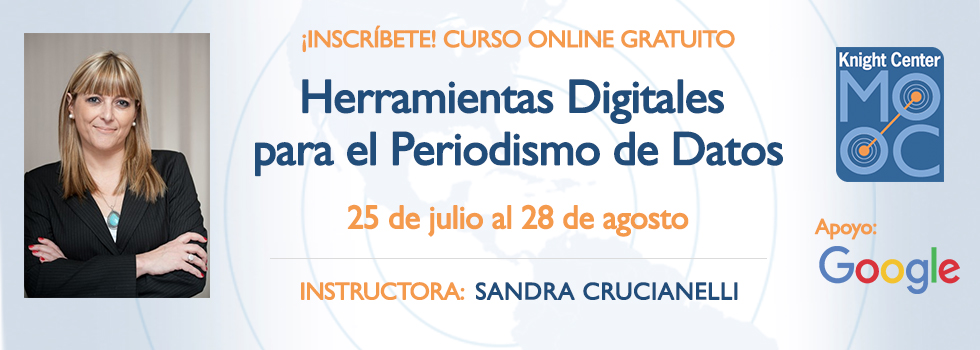
From July 25 to August 28, Argentine journalist Sandra Crucianelli, veteran instructor of Latin American journalists, will teach a new and revised version of her successful massive online course “Digital Tools for Data Journalism,” organized by the Knight Center for Journalism in the Americas with the support of Google.
Registration is open. Click here to see the course schedule and to sign up.
Since 2004, Sandra Crucianelli, a specialist in data journalism, has trained thousands of journalists in Latin America through online courses offered on the digital distance learning platform of the Knight Center.
Anyone with internet access, from anywhere around the world, can participate in this five-week MOOC (Massive Open Online Course) about data journalism that will be conducted in Spanish.

Crucianelli was a Knight Fellow with the International Center for Journalists (ICFJ) and now participates in the team of reporters from the International Consortium of Investigative Journalists (ICIJ), which investigated the case known as The Panama Papers.
With her experience, Crucianelli has led several investigative projects in Latin America and is author of the book “Digital Tools for Journalists,” published by the Knight Center for Journalism in the Americas (2008 and 2013) in Spanish and Portuguese.
As data journalism is based in interdisciplinary work, this course is aimed at reporters, editors, graphic designers, programmers and the general public. There will be five modules, one each week, which will remain open throughout the course.
Crucianelli envisions a collaborative model for the course.
Students will be given a comprehensive introduction to data journalism in the first week. The second and third weeks will address techniques for extracting data from the web and for analyzing the data. And in the last two weeks, participants will be guided on the themes of interactive data visualization and on the development of new narratives based on those same data.
“We will analyze something that we have never done before: variables of quality for portals of open government. This is very important because we have serious difficulties in using these data sets that governments provide for us and whose documents are public in nature,” Crucianelli said.
“We are very excited at the Knight Center to present this course once again with a new version, filled with tools and details that have not been addressed in previous versions. Data journalism is evolving very rapidly and Sandra Crucianelli is at the forefront of this evolution,” said professor Rosental Calmon Alves, founder and director of the Knight Center.
“For more than a decade, Sandra has had great success with her online courses and through our digital platform for training journalists. I am sure that this MOOC will be another great success,” Alves added.
Another novelty of the new version of the Digital Tools course is that it will take into account participants’ levels of knowledge of data journalism in the practice forums in each weekly module. There will always be a forum for the basic level, for those that are just starting in data journalism, and another level for those who are more advanced, who are already working in a data unit.
“In the most advanced forums, we will propose some interesting challenges and see if we can resolve them,” Crucianelli said.
Although the course is free, students who wish to receive a certificate of participation must meet the requirements of the course and must pay a fee online of US $30, using an internationally valid credit card. The certificate will be awarded only to students who actively participated in the course and have satisfactorily completed the tests and exercises.
Certificates can be downloaded from the internet in PDF format after the Knight Center has verified that the requirements were met. No formal academic credit is associated with this certificate and the document will be submitted only in electronic version.
“We are grateful to Google Latin America for its support, which allows us to offer this free online course in Spanish that is open to journalists and the general public. Thanks to the help of Google, in recent years, the Knight Center has been able to train thousands of journalists and communicators in Latin America for free with courses in Spanish and Portuguese,” Alves said.
This is the twenty-second MOOC offered by the Knight Center of the University of Texas at Austin. The Center was created in 2002 by Professor Rosental Calmon Alves, holder of the Knight Chair in Journalism and the UNESCO Chair in Communication at the School of Journalism of the University of Texas at Austin. The Center launched its pioneering and unique MOOC program for journalism courses in 2012 and has since reached about 70,000 people from 160 countries.

Knight Center for Journalism in the Americas
300 West Dean Keeton
Room 3.212
Austin, TX, 78712
Phone: 512-471-1391
Email: journalismcourses@austin.utexas.edu